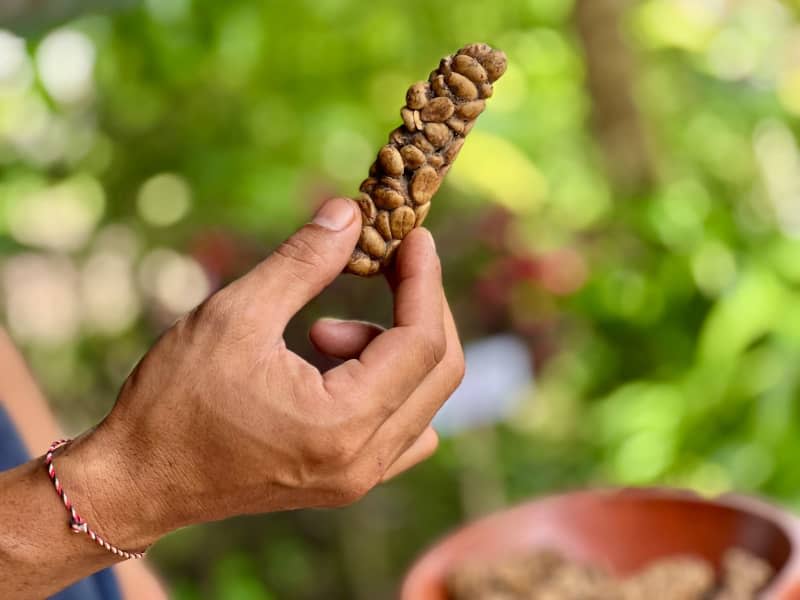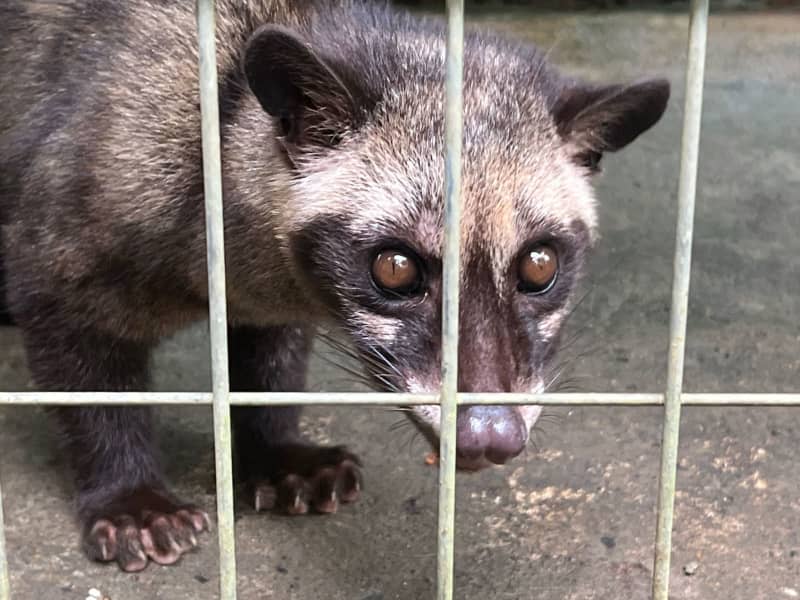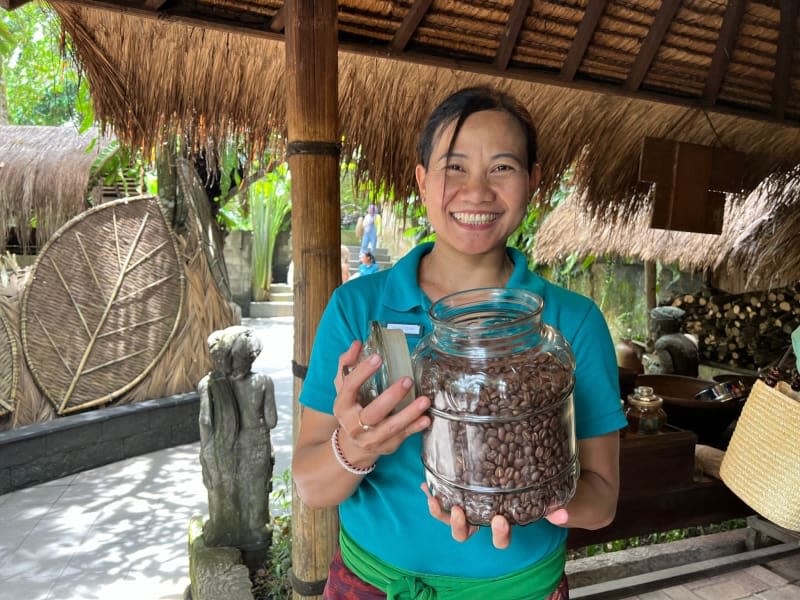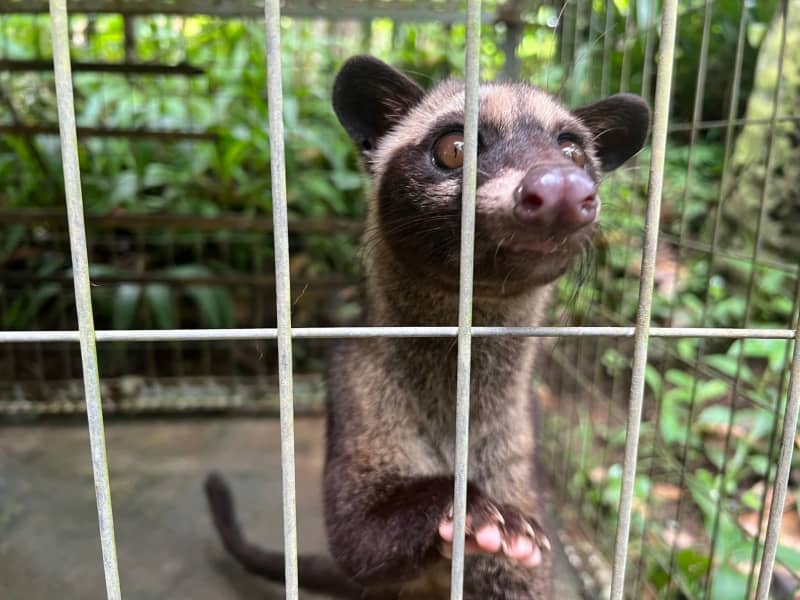Kopi luwak: The suffering behind the world's most expensive coffee

Bali's coffee gardens are the perfect place to relax, where you can sip your brew while looking out onto lush rice terraces lined by coffee trees carrying crimson berries.
Most people come to try the world's most expensive coffee - kopi luwak.
Often sold in pretty packaging, kopi luwak is made from coffee cherries digested and then excreted by the Asian palm civet, fermenting as they pass through the animal's intestines.
Producers claim that the fermentation process alters the amino acids and therefore makes the coffee less bitter and easier digestible.
It also is said to have a special aroma, often described as earthy, mildy spicy and chocolaty.
Some might find it difficult to stomach, however, that the civet cats are subject to immense cruelty due to the hype.
A shy, nocturnal forest animal native to South and Southeast Asia, on Bali sometimes up to 100 cats are held in often tiny cages on farms where kopi luwak is produced en masse, says Jason Baker, vice president of campaigns for PETA Asia.
Dirty cages, one-sided diet
Employees of the animal rights organization recently went undercover again to visit some of the farms that supply companies and supermarkets abroad and documented the appalling conditions.
"For 10 years we have done regular investigations on this topic, but nothing changes," says Baker.
A disheartening verdict as animal rights activists have been sounding the alarm over the treamtent of the palm civets, not just on Bali but also in other parts of Indonesia and the Philippines, two of the main producers of kopi luwak.
The musangs, as the palm civets are also known, are mainly fed coffee berries and are hardly able to move in the bare, often filthy cages, Peta found.
As nocturnal animals, they would usually spent the days hiding inside trees or burrows, but "In these cages they have no place to hide, and often they are exposed to direct sunlight," says Baker.
The unbalanced diet also affects the omnivores who - in the forest - would feed on fruits, insects, worms, eggs and small birds, among other things.
"Some of the civet cats bite themselves or hurt themselves in other ways out of stress. Also, they pace around, which is another sign of stress and frustration."
Tourist trap
Bali's coffee gardens, many situated near the island's yoga stronghold of Ubud, cater exclusively to tourists and most keep at least one or two civet cats in a slightly larger cage to allow customers to catch a glimpse of the animals - and to assure them that they are treated well.
But even those specimens usually don't have enough space or a place to hide from the daylight. Instead they spend their days devouring the coffee cherries thrown to them by employees at regular intervals.
When asked, whether the animals have to bide all their time in such a cage, employees in almost all coffee gardens have the same response:
"At night we let them out so that they can go to the jungle, and in the morning we catch them again and take them here," they say. This is a new version of "After a few weeks we liberate the civet cats and exchange them with new ones," which was still popular a few years ago.
For most tourists, that seems to be reassuring enough to buy kopi luwak with a clear conscience.
"Of course, these are all lies," Baker says. "But they have to hide the truth otherwise the tourists wouldn't come anymore."
Producers sell kopi luwak as if it was "a traditional cultural thing. But the Balinese don’t usually drink this coffee."
Even PETA doesn't know how exactly the civet cats are caught. "So far, we never got permission from the plantations to go with them," Baker says.
Booming export business
Kopi luwak can achieve staggering prices of up to €1,000 ($1,084) per kilo when sold abroad, while online 100 grammes are available from €30 to €40.
Coffee fans are lured with the assurance that "free-range Luwak cats select the best beans in the forest." Those are then collected and processed by local farmers after pre-digestion, according to retailers.
Such promises are "a huge scam," writes German-based animal and nature conservation organization Pro Wildlife on its website.
According to estimates by experts, all of Indonesia's free-roaming civet cats together probably only produce around 300 kilograms of kopi luwak per year, the report states. "This is nowhere near enough to meet the constantly growing demand for a luxury sip between meals."
But the delicacy is exported by the ton every year, Pro Wildlife says, meaning "The industry is aware of the immense animal cruelty behind the product - but the well-heeled customers are kept in the dark."
In Bali, the coffee garden operators are slowly starting to realize that the animal rights campaigns are bad for business, with some having gotten rid of the cages.
Instead, visitors are led to admire apparently free-roaming civet cats lying motionless on a couple of wooden planks.
"Why do these animals not simply run away?" a visitor asks. "The animals that we show here are old and weak. They are not going anywhere," an employee responds.


